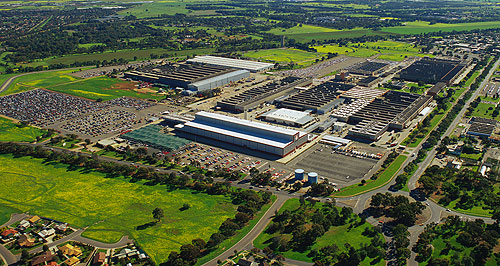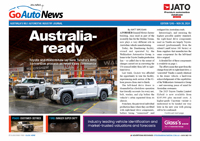Make / Model Search
News - HoldenPunch's Holden plant bid failsHolden on: Belgian businessman Guido Dumarey is in Australia for talks over the future of Holden's Elizabeth plant. Canberra puzzled, FAPM irate as Punch’s bid to keep Commodore in production fades29 Feb 2016 By IAN PORTER GENERAL Motors has announced that the Punch Corporation proposal to keep Holden's assembly plant in Elizabeth, South Australia in operation after production ceases in 2017 will not go ahead. The failure of the proposal to progress has been met with scorn and scepticism by some government and industry figures. A joint statement from GM Holden and Punch Corporation released late on Friday said that the two companies undertook a “detailed global evaluation” of the proposal before determining it would not proceed. “Both parties concluded that a viable business model was not possible for this case. Therefore the proposal will not be taken forward,” the statement read. “The challenges to domestic automotive manufacturing in Australia – lack of scale, high production costs, supply base contraction and increasing market fragmentation – persist and cannot be overcome for this business case. “In particular, the wind down of the supply base following the manufacturing exit of the three existing car makers, and the critical production mass they represent, is insurmountable. “GM thanks Punch Corporation for their proposal. GM will continue to consider Punch Corporation, along with other interested parties, to participate in the sale process of the Elizabeth plant and assets after GM ceases local manufacturing. “Punch Corporation will continue to pursue other business opportunities in the Australian automotive sector.” Both industry minister Christopher Pyne and one of his predecessors, Senator Kim Carr, expressed doubt about the claim that GM and Punch had completed a “detailed global evaluation” of the proposal before pulling the pin, while the local parts industry was irate about being made the scapegoat for the decision. “What I think about it isn’t printable,” Federation of Automotive Products Manufacturers (FAPM) manager Tom Chappell told GoAuto on Sunday night. “They’ve got their own reasons for not doing it, but the supply chain is not one of them. I was pissed off when I read that.” The failure of the proposal means the car industry will shut down at the end of 2017, with the estimated cumulative loss of 45,000 direct jobs within the car-makers and the Tier One parts suppliers. Many more indirectly employed workers are also threatened in the Tier Two and Tier Three companies that form part of the Australian supply chain. Shock and dismay over the decision was shared across the political divide in Canberra. “I am surprised and disappointed at the sudden announcement from Punch Corporation and General Motors this afternoon,” Mr Pyne said in a statement. As industry minister, Mr Pyne has recently expressed concern about the imminent closure of the car industry. “It does not match the statements both Punch and GMH have made to me,” his statement says. Senator Carr told GoAuto on Sunday night that he shared Mr Pyne’s disappointment. He said he had been aware that Punch chief executive Guido Dumarey – who was in Australia earlier this month – was scheduled to have a meeting in Tokyo late last week with a team from GM’s head office, not GM International's regional office in Singapore. “I thought the Tokyo meeting was about getting more information. It was a series of questions they needed answering before Punch could put together a full financial plan. “I don’t think they (Punch and GM) did do a full financial plan. There’s something else going on,” Senator Carr said. In the joint statement issued after the Tokyo meeting, Punch and GM cited several reasons for the proposal not going ahead, including a lack of production scale, high production costs and fragmentation of the market, as well as the wind down of the supply base. However, FAPM’s Tom Chappell dismissed that excuse out of hand. “GM’s got their own reasons for doing this, but the supply chain is up and running,” he said. “The companies are supplying, they are supplying at rate. Why they could not keep supplying (to Punch) is beyond me. “No-one’s closed down. They are still planning to supply for the next two years and many of them are continuing to diversify out of automotive and into other things, so they’re financially viable in the long run.” Mr Chappell said FAPM members were keen to keep supplying to the Elizabeth plant after GM left. A recent survey of parts suppliers showed that 100 of the remaining 150 would close their doors if car manufacturing ceased in 2017. “If, by some fortunate strike, this all came together and it worked, those guys would have moved heaven and earth to supply to a new venture building Commodores in Adelaide for global markets,” Mr Chappell said. “I’m sure they would have thrown all their weight behind that to support the bid from Punch going forward.” Mr Chappell said the local supply chain was keen for the plant to keep operating. “I want it on the record that the supply chain is fully supportive of this bid and there is no reason to think that the supply chain could not fulfil that task of supplying parts to Punch for the long term.” Mr Chappell said he believed the decision was one made back in the Detroit head office of GM and not at Holden headquarters in Fishermans Bend. “I don’t think they were even involved in the decision. It was a decision made in Detroit by the merger and acquisition guys.” Mr Chappell said it was a simple case of GM wanting to stay in the Australian market but not wanting the expense of manufacturing. “They want the revenue, but they don’t want the costs.” There were other reasons to be sceptical, according to Mr Chappell. “Why would they let someone else take a share of their market? Why would they let somebody else sell Commodores against their Commodore replacement? “To me, it’s just a very hard-nosed business decision that doesn’t make any allowance for all the hard work that’s been done over many years by good old Australian engineers and workers, and the taxpayers.” Despite the disappointment about the decision and the scepticism about there having been a full financial assessment done, Senator Carr said he would continue to concentrate on the positives. “Punch says in the joint statement that it is looking at other Australian automotive investments and I believe they are coming to Melbourne again very soon,” Senator Carr said. “I welcome Punch’s continuing interest in further investment opportunities in the Australian automotive industry and I will do all I can to facilitate keeping Australian automotive workers in employment.”  Read more |
Click to shareHolden articlesResearch Holden Motor industry news |












Facebook Twitter Instagram